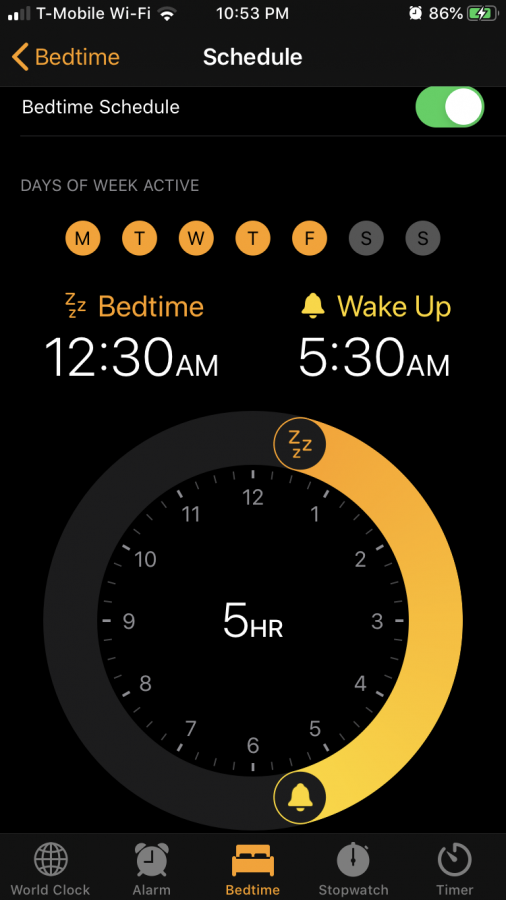Sleep Deprivation in High School Teenagers
Here is a student’s alarm that aims for 5 hours a sleep a night
Teenagers in high school report that they get an average of 7 hours of sleep when an average teenager should be getting between nine and nine and a half hours of sleep per night.
As a senior in high school, I can tell you first hand, that sleep deprivation is one of the most common problems in a high school student’s life. At our age, studies say that teenagers’ brains and bodies are still growing. Personally, I can’t remember the last time I had 8 hours of sleep before a school day. Sure, we all say that we’re fine and that we can handle it, until something happens that shows us that we actually can’t handle it. I want to spread awareness to other high school students of the importance of a good night’s sleep.
Not only does sleep deprivation make it harder to stay awake at school, but it also affects reaction time. Many juniors and seniors in high school are able to get their driver’s license and drive themselves to school. This may be dangerous if they are experiencing sleep deprivation. Their reaction time is slower, and they also risk the chance of falling asleep at the wheel. According to the 2016 Teen Driver Car Accident Statistics by Edgar Snyder Associates, 4.4% of 17-year old’s have been involved in a car crash while 4.7% of 18-year old’s have been involved in a car crash. These percentages are higher than any other age group.
What’s the solution for this? Starting school at a later time to get students the time that they need to study while also getting a decent amount of sleep. California passed a law pushing back high school’s start times to 8:30 a.m. at the earliest. This law should be passed in every state due to the mass sleep deprivation in schools.

EMAIL: [email protected]
Hi! My name is Lisa Hopoi and I’m from ʻAiea. I’ve been attending Kamehameha since the 7th grade and I’m currently a Senior. For as long as I can remember, I’ve always loved to write stories and I can’t wait to take part in Ka Mōʻī. I am most interested in the interviewing aspect of Ka Mōʻī because I love to hear what people have to say about different events happening around campus. I hope to spread the news and keep everyone up to date about what’s happening around campus.



Makoa Inciong • Nov 26, 2019 at 12:56 pm
I think this is a great article that really highlights an issue that is agreed upon by nearly everyone in the school. I think everyone would say they aren’t getting enough sleep and could do significantly better academically and athletically. That’s why I find it interesting that our school administration says they are striving for excellence while simultaneously driving their students into the ground with unrealistic workloads. They seem to believe that more work equals better grades, but it’s a bit hard to get good grades while operating on 5 hours of sleep and therefore reduced efficiency in the classroom. I think our school admin would do well to listen to their students once and a while, instead of blaming us for poor time management as the prime reason for little sleep all the while wasting our time in meaningless Ka Na’i Ponos where all we do is listen to a story about flight attendants and an admin trip to the mainland. Anyway, wonderful article 🙂
Kenna Higa • Nov 26, 2019 at 12:47 pm
I fully agree with what you are trying to spread awareness about. It is true that high school students do not get enough rest. As a teenager, you juggle with the stress of keeping up your grades, while also trying to keep your social life intact, and some even have school sports on top of that. I know for a fact that some schools don’t even get free time throughout the day. This is an ongoing problem all over the world, but with this topic you have to look deeper. We have to look at the other aspects of schooling to help and fix this problem; for the students.
Kiana Zimmermann • Nov 26, 2019 at 12:39 pm
I think this article is very informational on students’ perspectives of school. Due to many students striving higher and taking advanced classes, it piles on more homework which allows students to get less sleep. With less sleep, we won’t perform as well as the article says, and the cycle will continue throughout the year. Although, I believe it would be hard to push back the time school starts due to the time school ends. Although it would benefit students to start school earlier, the end of school would be pushed back as well, which would also push back extracurriculars, and more.
Ridge Kaauwai • Nov 26, 2019 at 9:28 am
I think that it’s quite remarkable that we are only able to get 7 hours of sleep when we are supposed to get a minimum of 9. My only concern is that I don’t think pushing back school hours is a decent solution to the problem. It doesn’t excuse the fact that everything will just be pushed an hour or so back by the school and everything around it. in the end, we will just have less time at night. Also, another ting that seems to keep people awake is blue light. According to a documentary I saw, people will have a struggle with sleeping if they are trying to go to bed an hour after looking at a blue light. This is emitted by any electronics that are commonly used today. I don’t really know if that has anything to do with students not being able to sleep, now that we all have to use electronic devices daily, but even giving people more time in the morning or afternoon won’t always be used to get some extra Z’s.
Hiia Hashimoto • Nov 26, 2019 at 9:12 am
According to our school’s admins, the concept of a full night of sleep is achievable if and when we manage our time properly to fulfill our responsibilities. this inference on the part of the school’s administration is made without the actual experiences or daily activities and as such appears much more doable on paper or in planning than the actual execution. as such, I feel that the admins should stop making these presumptions without first attempting this vigorous schedule.
Keahe Silva • Nov 26, 2019 at 9:10 am
First, thank you for writing this article. I believe that it is very important for people to know about the amount of sleep students are getting, especially teachers. I find it interesting that they expect us to be fully functional in the morning and ask us why can’t stay awake during class when they also know that our homework, school, and sport schedules are very taxing. We have voiced our opinion multiple times to the teachers and staff regarding the amount of time we get for sleep and yet there still hasn’t been any change. I hope that more people read this article to gain more understanding and I hope that they can support us so we can create change. Thank you again.
Lionel Barona • Nov 19, 2019 at 11:57 am
Great data, Lisa! Thanks for sharing this important topic.